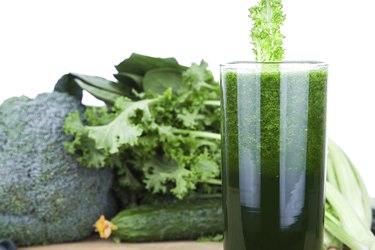
Kale is a leafy green vegetable that is low in calories and high in nutrients such as iron, potassium, calcium and vitamin K. The fact that kale is packed with nutrition makes it a common choice for juicers. However, along with the health benefits of kale juice it is important to be aware of its risks and side effects. Speak to your doctor before consuming kale juice.
Detox Dangers
Video of the Day
One cup of kale only contains 34 calories. If you are using other low-calorie items to make your juice, you are not likely consuming a substantial amount of calories with each serving. Problems associated with detox diets that require you to consume a very small amount of calories include muscle breakdown, stomach upset, blood sugar problems and vitamin deficiencies.
Video of the Day
Stomach Distress
A side effect of juicing is intestinal discomfort symptoms. While following a juice diet, you may experience stomach cramps, gas and diarrhea. The ingredients used to make the kale juice can be blamed for these symptoms. The symptoms are related to the ingestion of sorbitol, a type of sugar found in juices that cannot be digested.
Hyperkalemia
Hyperkalemia is a medical condition associated with high amounts of potassium in your blood. Hyperkalemia symptoms may include muscle weakness, fatigue, diarrhea and chest pain. If you are consuming too much kale through your juice diet and you are diagnosed with hyperkalemia, your doctor may recommend a low-potassium diet. Along with kale, other foods to avoid on a low-potassium diet include potatoes, oranges, orange juice, broccoli and spinach.
Too Much Iron
Although it is unlikely, rare cases can develop where you have too much iron in your body. If this is the case, your doctor could recommend reducing your iron intake and avoiding foods such as kale, other green leafy vegetables, beans, nuts, dried fruits and whole grains. High iron levels in the blood cause symptoms such as headache, weight loss, fatigue, skin color changes and stomach upset.
Blood Clotting
Kale is high in vitamin K, with 547 micrograms in a 1-cup serving, which is over 6 times more than the recommended daily intake for adults according to the USDA. The National Institutes of Health reports that Vitamin K is referred to as the "clotting vitamin," as it contains proteins that promote clot formation. If you are on an aspirin regimen for your heart, or take blood thinning medications, consuming juiced kale will interfere with the amount of medication you need, along with the medications' effectiveness. If you have issues with blood clotting, speak to your doctor before consuming kale juice.
- MSNBC: Experts Warn of Detox Diet Dangers
- Baylor College of Medicine: Too Much Juice Can Cause Intestinal Discomfort Usually Blamed on Milk
- United States Department of Agriculture: Nutrient Data Laboratory
- The New York Times: Iron in Diet
- Chemocare: Hyperkalemia
- National Institutes of Heath: MedlinePlus: Vitamin K